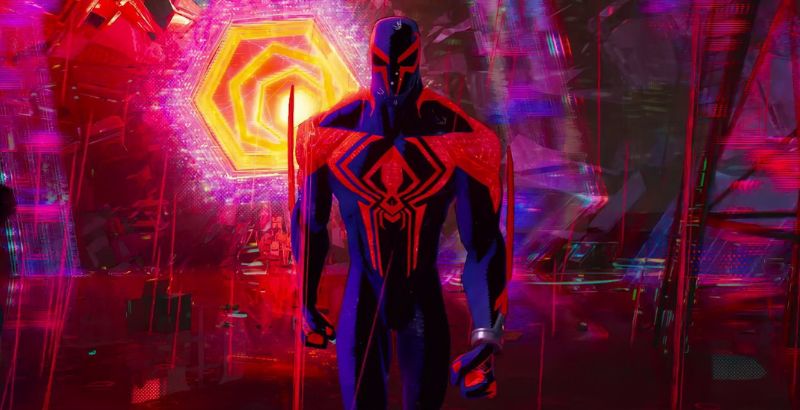
This article has light spoilers for Spider-Man: Across the Spider-Verse
Spider-Man: Across the Spider-Verse is an animation triumph. It’s a mixed-media animated love letter to what it means to Spider-Man, Spider-Woman, and everything else by connecting each of the iterations of the hero and also exploring the expectations that come with that. More specifically that in order to wear the mask, you need to suffer and come out the other end stronger. Miguel O’Hara, Spider-Man 2099, sees himself as the protector of the multiverse. He works to stop anomalies in the multiverse and ensure that the canon events, the moments of great tragedy in a Spidey’s life, happen without interruption. Miguel sees his attempt to escape his grief as his biggest mistake and thus ensures that others don’t do the same.
Miguel is someone we all know. He has been through the fire, but instead of putting it out so others don’t have to endure it, he thinks it’s necessary everyone else be burned too. To be a Spider-person you must endure tragedy. Your canon event, as the film calls it, can’t be from joy or success. The event that solidifies you as Spider-People must be grief. For Miguel, a man who tried to rewrite his story and failed, resiliency is the only answer and pain is inevitable. This is a core story beat for Across the Spider-Verse and one that hits too close to home.
Miles is not a bystander. He is guarding the boy his mother loves. He is creating a space for himself, and he is doing this by understanding his needs and wants and refusing to endure what those before him have. While Into the Spider-Verse was a story about understanding that you can wear the mask, the sequel is about fighting to wear it your way. That said, Miles isn’t without his own grief. He lost his uncle and carries that weight through Across the Spider-Verse. Miles had his canon moment, and he doesn’t have to go through more pain to build his resiliency, he is already resilient. Refusing to endure doesn’t mean you are without any past. It just means that you value yourself enough to protect your dreams of something better.
When I quit my PhD, my mom was angry. I called her crying for support but got the cold shoulder. I told her I made the decision after weighing the racism I had experienced and the constant sexist remarks by students and my colleagues. I thought about how much more I could fight to be in a place that told me I didn’t belong. My mom grew up surrounded by colorism in a school system that beat her if she spoke Spanish. She was pulled over by a cop and made to apply a registration sticker she had just gotten in the rain on the side of the highway alone with me in the backseat and no one to call. My mom has seen things she won’t ever tell me, and my grandparents, who had picked vegetables in the field and didn’t finish elementary school, were the same. To my mom, my choice undercut all of their trauma. They had endured, so I should too. I should endure the pain and carry it because it would make me into something better.
I am not Spider-Man. But like the canon events that Miguel is trying to force Miles and ther other Spider-People to endure, I couldn’t help but think that I should have endured mine. Across the Spider-Verse is a grief story. There is no denying that. Still, it speaks to something bigger than the way that pain forms one’s life. It shows the audience how it radiates out, and those who have endured pushing those younger than them to thread the needle of trauma in order to be “who they are meant to be.”

While Miles’ parents don’t do this, they are quick to bring up the history that has placed him in his school and on the road to Princeton. His mom brings up his grandparents and tells him without hesitation that she would have given up everything to be in his position. And that weight is crushing. It’s through Miguel where the past generation’s adversity takes root. Miguel is the colleague who tells you “That’s just how it is” and “I’ve heard that too.” Miguel is the person who just thinks because he had to crawl under the crushing pressure of hardship that everyone else should too.
Miguel isn’t the bad guy in any clean way. He’s a man debilitated by what the world did to him and the choices he made. However, he understands his pain as necessary for becoming the man he is. He became Spider-Man 2099 because of his trauma, not in spite of it. Miguel and the other Spider-men have lost big. They’ve cried and they’ve tried to walk away, and they’ve learned to accept that you can’t save everyone. That in and of itself is an important message, but to accept that without trying to push back against it is to accept a story that someone else has written.
While Miles’ mom tries to guilt him when he falls out of line, that firm hand becomes a soft one when she sees him happy. Instead of wanting her son to go through what she or his father or uncle did, she wants him to be protected. Where Miguel treats pain as a necessary part of life, Rio tells her child to protect the boy she has protected over the last 15 years. She tells him to never let anyone feel like he doesn’t belong, and while she means at Princeton, it’s applicable here. Miles doesn’t belong because he doesn’t want to acquiesce to the trauma. He wants to stop it.
Learning that you don’t have to endure is a gift of agency that many of us from marginalized backgrounds don’t have the privilege of finding sometimes, until too late in life. But once we do, we’re changed. Leaving a situation of sexism and racism didn’t stop me from experiencing it elsewhere, especially since I began working in the tech sector. My mom was right in that I couldn’t outrun bigotry. That said, I didn’t have to take it lying down in order to be respectable. After choosing myself and changing my career, like the promise Miles made to his mom in Across the Spider-Verse, I made that promise to myself. I will protect me, and respect myself even when others don’t.
It’s something big, like calling HR when another employee went on a racist tirade against me and my “aggression” for simply denying her request to do her job for her. Or, it’s how I don’t allow anyone to mispronounce my name without correcting them no matter the setting. I will endure when necessary but I deserve to thrive in my future, not just survive.
Spider-Man: Across the Spider-Verse is a generational story in a way that I didn’t expect. I thought I’d strap in for some superhero fun and a coming-of-age story and instead, I got a story about a teen deciding that the way those before him have endured and accepted trauma, isn’t what he will do. I readily admit that my reading to the film is only one piece of a larger narrative. Miguel isn’t a bad guy. He’s an antagonist. Miguel and the rest of the Spiders that Miles trusts like Gwen Stacy and Peter all connected by the fact that they have all experienced loss. Because they’ve all felt that pain and made it to the other side, they’ve resigned that the bad in life will just happen, and it’s futile to stop it. It’s canon.
You have to accept it. And in a way, that is true. Being taught to endure and building your resiliency is essential to making it through life. Life will, eventually, harm you. It can be because of racist systems and institutions, it can be through losing the people you love, or it can come from any number of things. The ability to keep moving through that is important. The Spider-People aren’t wrong. Miguel isn’t wrong. But they aren’t right either.
If we resign ourselves to accepting the bad because it will make us stronger, then we don’t ever choose our happiness first. We don’t choose our needs. Miles is choosing himself by trying to avoid another canon event, and in that, he’s trying to break the cycle of pain that shackles all the other Spider-Men that he’s connected to. When that struggle and perseverance is all you know, it can feel scary. But the truth is, people like Miles are essential to the betterment of our communities and ourselves. Miles deserves to thrive, not just endure.
Spider-Man: Across the Spider-Verse is playing now in theaters everywhere.






